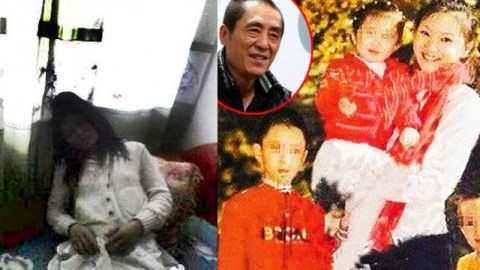China’s new eugenics: the poor are aborted, the rich shall live

Horrible, horrible social injustices
“I feel like a walking corpse.”
BEIJING – Left picture: Gong Qifeng is traumatized and suffers from schizophrenia ever since the forced abortion of her second boy two years ago when she was seven months into her pregnancy. China’s ‘One-child policy’, although recently loosened, is still cruelly imposed on those living in the lower strata of society. The young pregnant mother was simply “taken away by officials,” Didi Tang from The Associated Press reported. The subsequent brutal procedure and the excruciating pain during her 35-hour ordeal (basically, it’s poisoning the unborn baby and, once it’s dead enough, pulling it out with a ruck) left her spirit broken and her family in shame. She and her husband, Wu Yongyuan, moved to Beijing this year to petition their plight to the central government, unsuccessfully.
Right picture: Zhang Yimou apologizes in public for having fathered three children (he acknowledged just three; the public says he may have fathered up to seven kids with his wife and three mistresses). He is sorry, he says, and will pay $1.2 million for cheating on the One-child policy, letting alone betraying his 1,3 billion countrymen. Ironically, the star director’s main theme in his movies like Red Sorghum, Raise the Red Latern, Hero, and The Flowers of War, is abuse and suffering, but never injustice. In fact, most of his plot characters do get exactly what they deserve, each according to his or her social rank, gender role, and personal circumstances – prostitutes get raped, soldiers get slaughtered, traitors get executed, emperors just get a moral lesson, and so on.
Money, money, and connections
So, Gong Qifeng and Zhang Yimou both see the consequences for their breaking what effectively are “breeding laws,” and each of them is disciplined according to his or her personal circumstances: “At least I can afford to raise children,” the director said, “my children won’t endure hardships.” So won’t Gong Qifeng’s unborn boy, because he is dead now. Zhang Yimou showed what was described as genuine remorse in his I-apologize-on-state-media publicity stunt for having fathered so many children. It won’t happen again, said his wife. No wait, I made that last one up. She didn’t say a thing.
Which leads me to some questions; first about the way the two cases are presented in the media: Why wasn’t the first article about Wu Yongyuan, the father who lost his unborn boy; and why wasn’t Zhang’s wife, Chen Ting, in the spotlight of the second article? If it was Gong Qifeng (a female) who was taken away, drugged, and abused for mothering a second child, why is a Zhang Yimou (a male) in the headlines instead of his wife Chen Ting who mothered three? This isn’t just about social injustice; it’s also about China’s deep-rooted gender inequality: Women make it into the news for what has been done to them; while men make headlines for what they have done to women. Zhang Yimou, the patriarch, is presented like an uber-male: I am famous, I am rich, I made three children with this woman, and those rules are not for me, but I said sorry because I got caught.
The rage of the people against corruption
If money so easily solves this problem, than it isn’t really a “One-child-policy,” it should be called “First-child-is-free policy,” no? This would explain why so many Chinese professionals I worked with had two kids – most of them have simply given birth to a second child in the US or Hong Kong.
More and more ordinary Chinese stare into an abyss of daily reports about abuses of power, corruption, inequality, and the arrogance and privileges of their elites. They protest against censorship, exploitation, patriarchy, and nepotism – social illnesses that could be cured, so they hope, if only there was more transparency, division of powers, a free press, and the rule of law. People like Gong Qifeng and her husband do not just fight for human rights but more so for human dignity. Nobody deserves to to be treated like this, not even the non-notables.
Image credits: Associated Press (AT)/Echinacities.com
Read Gong Qifeng’s case at The Japan Times.
Read Zhang Yimou’s case at Financial Times.



